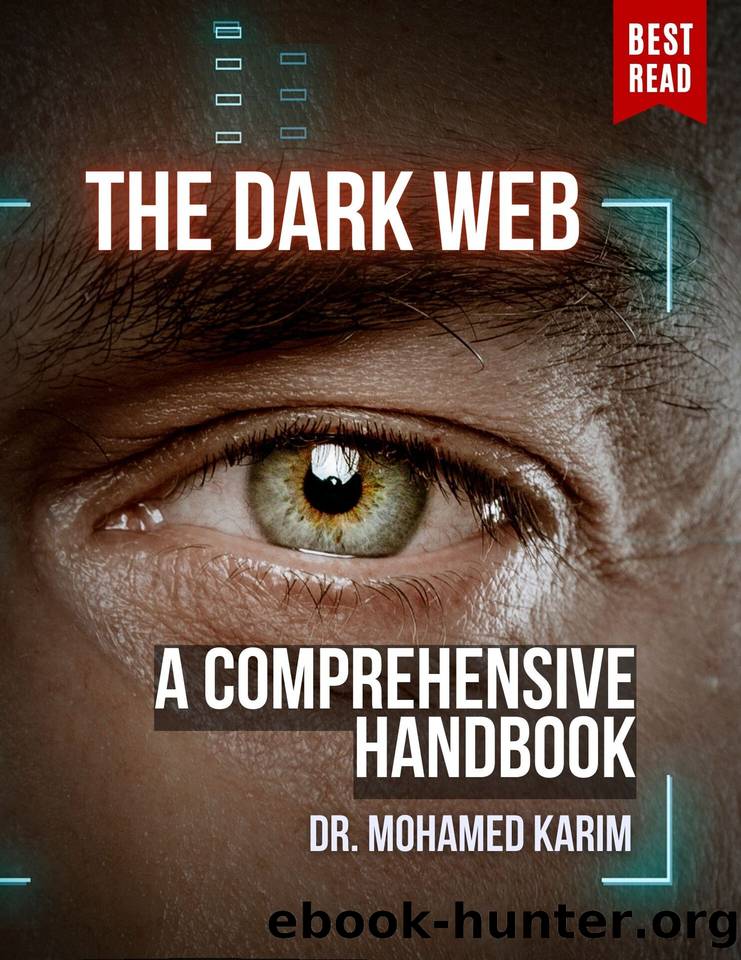The Dark Web: A Comprehensive Handbook by Karim Mohamed

Author:Karim, Mohamed [Karim, Mohamed]
Language: eng
Format: epub
Publisher: Mohamed Karim
Published: 2024-01-02T00:00:00+00:00
Chapter 11: Ethical Dilemmas and Philosophical Questions: The Dark Web's Existential Quandary
11.1. Introduction: A Moral Labyrinth
As we journey deeper into the intricacies of the Dark Web, it becomes evident that this digital realm is not merely a technological or geopolitical construct but also an ethical and philosophical conundrum. The Dark Web presents a range of ethical dilemmas and philosophical questions that challenge our conventional understanding of morality, legality, and human nature.
This chapter aims to dissect these complex issues, drawing upon various ethical theories and philosophical frameworks to provide a nuanced understanding of the Dark Web's existential quandary. We will explore questions related to individual freedom, collective responsibility, and the moral implications of anonymity, among other topics.
In doing so, we seek not just to critique but also to comprehend the ethical fabric of the Dark Web, attempting to grapple with the moral challenges that it presents to society at large and to each of us as individuals.
11.2. The Ethics of Anonymity: Freedom vs. Responsibility
One of the most pressing ethical questions posed by the Dark Web centers around the concept of anonymity. On one hand, anonymity enables individual freedoms, protects privacy, and offers a safe space for marginalized communities. On the other hand, it also allows for illicit activities, from drug trafficking to cybercrime, that exploit this anonymity to evade legal repercussions.
This dichotomy raises questions that tap into age-old debates in ethical theory. Utilitarian perspectives might argue that the overall harm caused by the anonymous nature of the Dark Web outweighs its benefits, advocating for more stringent regulations. In contrast, deontological frameworks may emphasize the intrinsic value of individual freedoms and privacy, regardless of the potential for misuse.
The ethics of anonymity on the Dark Web thus presents a moral labyrinth that defies easy answers. It forces us to confront the tension between individual liberty and collective responsibility, raising questions about the ethical limits of technology and the moral obligations of society to regulate it.
11.3. Navigating Ethical Dualism: The Janus-Faced Nature of Technology
The Dark Web epitomizes the dualistic nature of technology, serving as both a beacon of freedom and a den of iniquity. This ethical dualism poses significant philosophical challenges, forcing us to reckon with the ambivalent potential of technological advancements.
From a consequentialist viewpoint, one could argue that the ethical value of the Dark Web should be assessed based on the outcomes it produces. Does it lead to more harm than good, or vice versa? However, this approach tends to oversimplify the complexities involved, reducing ethical evaluation to a mere calculus of pros and cons.
Alternatively, a virtue ethics approach would consider the character and intentions behind the use of the Dark Web. Is it being used for noble purposes, such as promoting free speech or protecting vulnerable communities? Or is it being exploited for selfish or malicious ends?
Navigating this ethical dualism requires a multi-faceted philosophical approach. It calls for a nuanced understanding that transcends binary ethical judgments, acknowledging the inherent complexities and contradictions that characterize the Dark Web.
11.4. Digital Existentialism: Identity, Authenticity, and
Download
This site does not store any files on its server. We only index and link to content provided by other sites. Please contact the content providers to delete copyright contents if any and email us, we'll remove relevant links or contents immediately.
| Cryptography | Encryption |
| Hacking | Network Security |
| Privacy & Online Safety | Security Certifications |
| Viruses |
Effective Threat Investigation for SOC Analysts by Yahia Mostafa;(7478)
Practical Memory Forensics by Svetlana Ostrovskaya & Oleg Skulkin(7198)
Machine Learning Security Principles by John Paul Mueller(7157)
Attacking and Exploiting Modern Web Applications by Simone Onofri & Donato Onofri(6829)
Operationalizing Threat Intelligence by Kyle Wilhoit & Joseph Opacki(6794)
Solidity Programming Essentials by Ritesh Modi(4582)
Microsoft 365 Security, Compliance, and Identity Administration by Peter Rising(4177)
Operationalizing Threat Intelligence by Joseph Opacki Kyle Wilhoit(3925)
Learn Computer Forensics - Second Edition by William Oettinger(3672)
Building a Next-Gen SOC with IBM QRadar: Accelerate your security operations and detect cyber threats effectively by Ashish M Kothekar(3659)
Future Crimes by Marc Goodman(3587)
Blockchain Basics by Daniel Drescher(3571)
Mastering Azure Security by Mustafa Toroman and Tom Janetscheck(3538)
Mastering Python for Networking and Security by José Manuel Ortega(3492)
Incident Response with Threat Intelligence by Roberto Martínez(3408)
The Code Book by Simon Singh(3167)
Mastering Bitcoin: Programming the Open Blockchain by Andreas M. Antonopoulos(3033)
Mobile App Reverse Engineering by Abhinav Mishra(2997)
From CIA to APT: An Introduction to Cyber Security by Edward G. Amoroso & Matthew E. Amoroso(2903)
